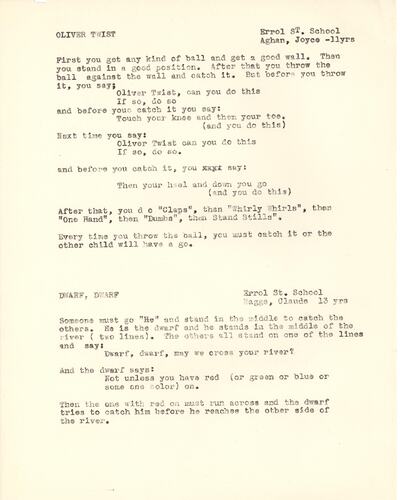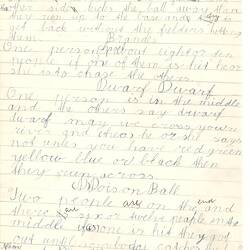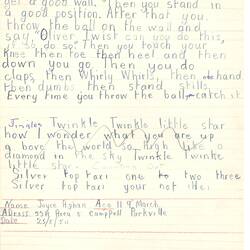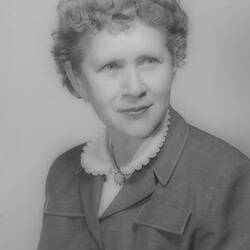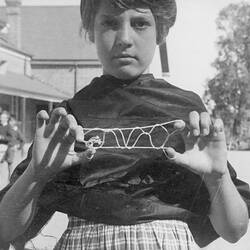Summary
Game type: 'Oliver Twist' (ball game), 'Dwarf Dwarf' (chanting game)
Alternative types: language play, games with actions, ball-bouncing rhymes
Typed descriptions of the ball game 'Oliver Twist' written by Joyce Aghan and the chanting game 'Dwarf Dwarf' described by Claude Naggs, students at Errol Street Primary School, for Dr Dorothy Howard in August 1954. It has been assumed that Dr Howard typed these versions of the original descriptions at a later date.
To play 'Oliver Twister', Aghan writes that a ball and wall are required. She explains that players throw the ball against the wall whilst reciting a rhyme and performing increasingly difficult physical actions before the ball returns. Naggs describes a chanting game called 'Dwarf Dwarf', which involves players asking one child, the 'dwarf', 'Dwarf Dwarf may we cross your river?'. He explains that the 'dwarf' responds 'Not unless you have red, green, yellow, blue or black', which presumably refers to the colour of clothing. The appropriate children are allowed to run past the 'dwarf'.
One of a collection of letters describing a children's game written to children's Folklorist Dorothy Howard between 1954 and 1955. Dr Howard came to Australia in 1954-55 as an American Fulbright scholar to study Australian children's folklore. She travelled across Australia for 10 months collecting children's playground rhymes, games, play artefacts, etc. This letter, together with the other original fieldwork collected by Dr Howard during this period, is preserved in the Dorothy Howard Collection manuscript files, part of the Australian Children's Folklore Collection (ACFC), Archive Series 3. The ACFC is an extensive collection documenting children's folklore and related research.
Physical Description
Typed game descriptions in black ink on paper. Features text on one side of page only.
More Information
-
Collection Names
Australian Children's Folklore Collection, Dorothy Howard Collection
-
Collecting Areas
-
Acquisition Information
Cultural Gifts Donation from Dr June Factor, 18 May 1999
-
Acknowledgement
Donated through the Australian Government's Cultural Gifts Program.
-
Author
Joyce Aghan - Errol Street Primary School, Parkville, Greater Melbourne, Victoria, Australia, 25 Aug 1954
-
Author
Claude Naggs - Errol Street Primary School, Greater Melbourne, Victoria, Australia, Aug 1954
-
Addressed To
-
Creator
Dr Dorothy Howard, Australia, 1954
It has likely that Dr Howard, or her assistant, typed up this document from an original, handwritten game description. -
Collector
-
Organisation Named
Errol Street Primary School, North Melbourne, Greater Melbourne, Victoria, Australia
-
Classification
-
Category
-
Discipline
-
Type of item
-
Overall Dimensions
203 mm (Width), 254 mm (Height)
Orientation: portrait
-
Keywords
